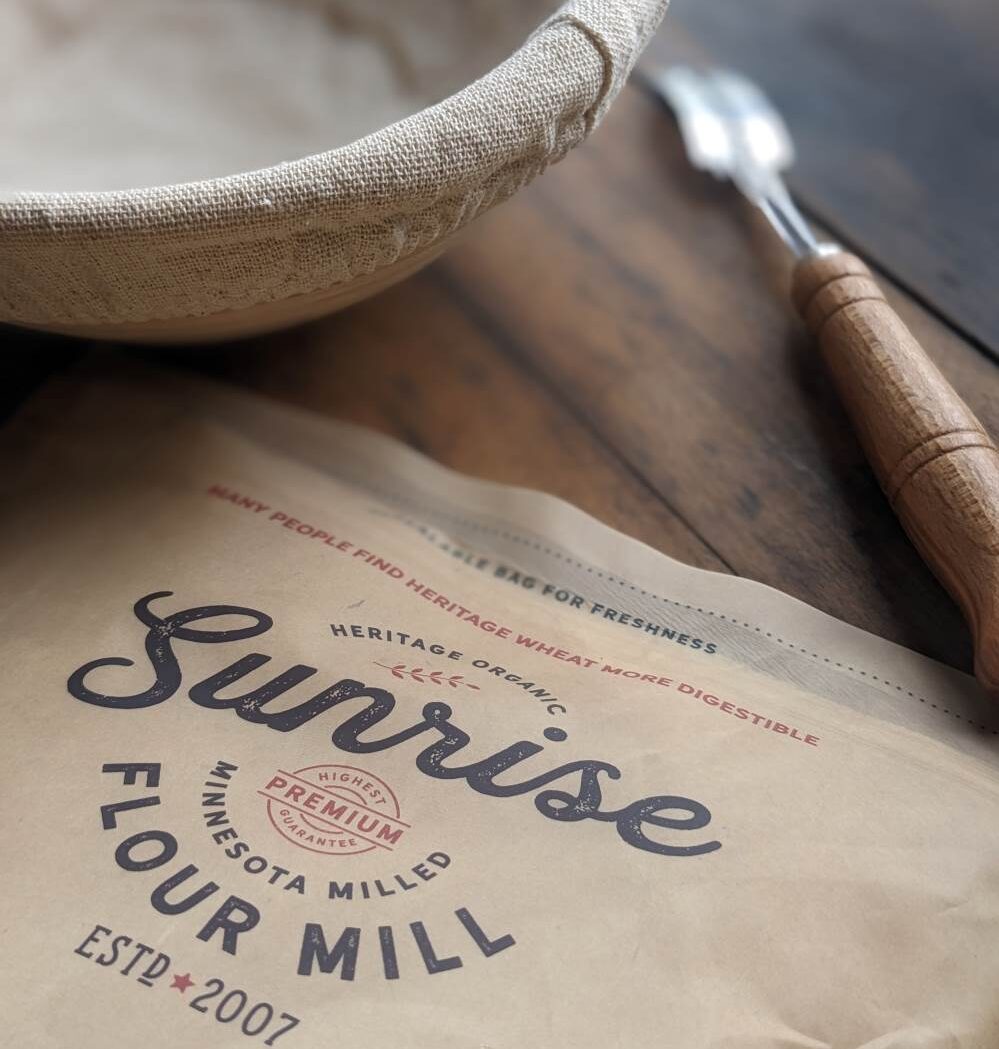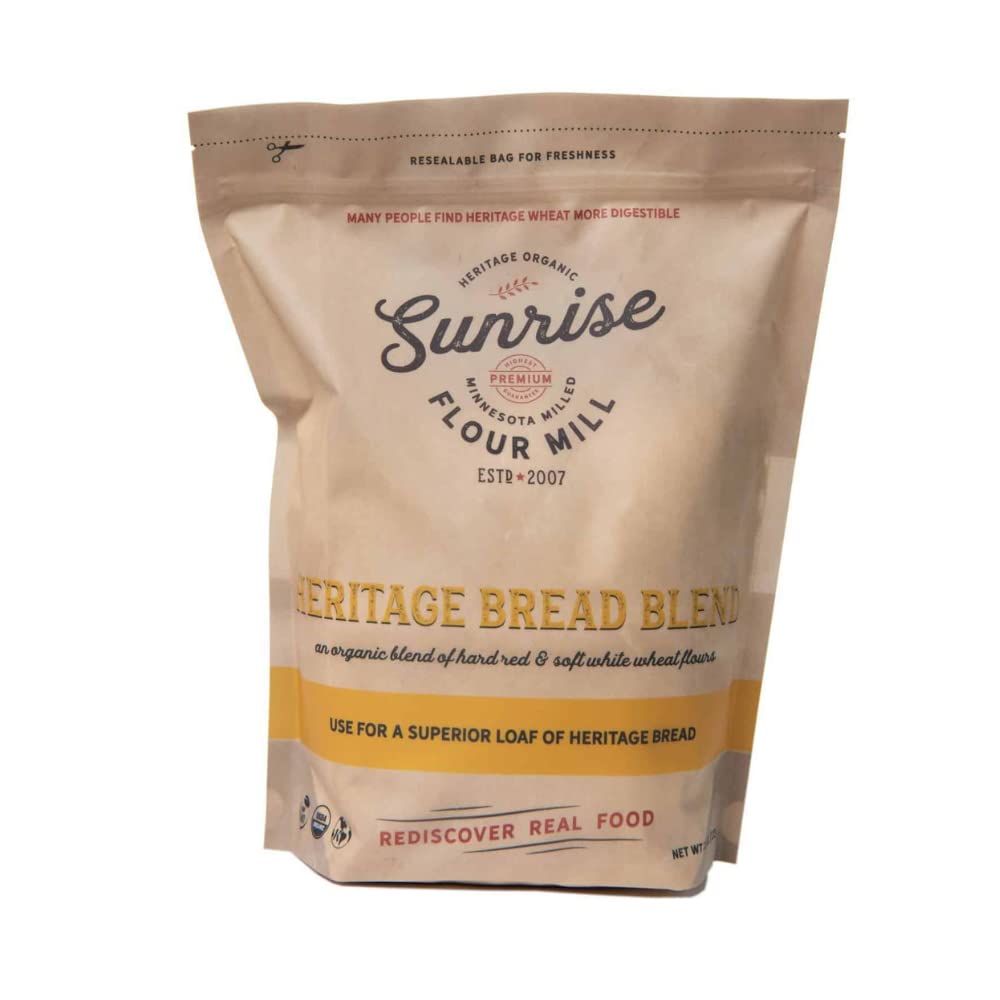We may earn money or products from the companies mentioned in this post.
(Last Updated On: March 29, 2024)Before the 1950s, wheat was known as Heritage Wheat, which was non-GMO and hadn’t been hybridized yet. This ancient form of wheat provided significant benefits to digestion compared to today’s modern wheat.
Our Favorites!
Best All-Purpose Flour
Sunrise Flour Mill’s Organic Heritage White Flour
Best Bread Flour
Sunrise Flour Mill’s Organic Heritage Bread Blend
Best Whole Wheat Flour
First, Heritage Wheat, being non-GMO, is believed to be more easily digestible for people with gluten intolerance. This means that consuming non-GMO wheat, like pre-1950s Heritage Wheat, might be beneficial for those who experience discomfort or gastrointestinal issues after eating products made from modern, hybridized wheat.
Another benefit to consider is the possible improved nutrition profile. Ancient wheats, such as Heritage Wheat, typically have higher protein and fiber content, contributing to better digestion. This can lead to increased satiety and support weight management goals. The presence of B vitamins in these ancient wheats also contributes to overall health and well-being.
Non-GMO heritage wheat, although not as widely available, can also be more environmentally friendly. The farming practices associated with Heritage Wheat production are typically more sustainable and have less of an impact on the environment. It’s a win-win!

Some companies, like our favorite and local Sunrise Flour Mill, offer Heritage Wheat products to people who want better digestion and healthier flour alternatives.
Best All-Purpose Heritage White Flour
Sunrise Flour Mill USDA Organic Heritage White Flour – 5 lbs
Our personal favorite is Sunrise Flour Mill USDA Organic Heritage White Flour.
Purchase directly from Sunrise Flour Mill and receive 10% off
Pros
- Made from organic heritage wheat berries, which are more digestible than modern wheat
- More digestible can mean less bloating!
- Amazing flavor and higher nutrient content compared to conventional wheat
- Milled using a single pass, high velocity impact mill that produces super-fine and fluffy flour
- Many people with gluten intolerances have been able to use this wheat without issues (please discuss with your doctor first).
Cons
- Pricier than conventional flour
- May not be suitable for those with celiac disease or severe gluten intolerance
Sunrise Flour Mill’s heritage white flour is made from single source, organic wheat berries using a renewed milling technology from the 1930s called the Unifine mill. This technology shatters the grain into very minute particles, producing a super-fine and fluffy flour that is ideal for creating lofty baked goods.
Sunrise flours are free from chemicals, pesticides, and herbicides – – a fantastic choice for those who want to avoid these additives. If you’re looking for a healthy alternative for modern all-purpose flour, this is it! I use this flour for all my general flour recipes, and it’s hands-down my favorite.
Best Whole Wheat Flour
Sunrise Flour Mill Organic Heritage Whole Wheat Flour – 2.5 lbs
Purchase directly from Sunrise Flour Mill and receive 10% off
We use heritage whole wheat flour as an add-in to our sourdough starter, pancakes, and muffins. We love a good flour blend which is why we use it in combination with the bread flour below and the white flour above.
Best Bread Flour Blend
Sunrise Flour Mill Organic Heritage Bread Blend Flour – 5 lbs
Purchase directly from Sunrise Flour Mill and receive 10% off
This heritage bread blend is used every weekend in our house when we make two loaves of sourdough. I also add in a little wheat flour and voila! Mouth-watering bread every time.

Understanding the Importance of Flour for Digestion
When it comes to digestion, the type of flour you choose can greatly impact your gut health. Different flours have varying effects on your digestive tract, influencing the absorption of nutrients and the overall functioning of your gut. When you choose the right kind of flour, you have the potential to improve your digestive health, energy levels, and overall well-being.
Whole-grain flours, such as whole wheat or oats, are typically better for digestion than refined flours, due to their higher nutrient and fiber content. Fiber is essential for maintaining a healthy digestive system – it can add bulk to your stool and support regular bowel movements. Whole-grain flours also tend to be broken down more slowly in your digestive tract, preventing sharp spikes in blood sugar levels, which can lead to energy crashes and cravings.
Modern white flour, however, is made up of simple carbohydrates, which are quickly digested and absorbed into the bloodstream. This rapid digestion can cause a spike in blood sugar levels, followed by a subsequent drop, leading to fatigue and hunger. If that isn’t enough, modern white flour is also typically stripped of many essential nutrients, making it less beneficial for your overall health.
Some healthy flour alternatives to consider are:
- Coconut flour: A grain- and gluten-free flour made by grinding dried coconut meat, which is high in fiber and healthy fats.
- Almond flour: Made from ground almonds, rich in protein, healthy fats, and vitamins.
- Buckwheat flour: A gluten-free flour made from ground buckwheat groats, high in protein and minerals.

Disadvantages of Refined and Low-Fiber Flour
Refined flours, such as all-purpose flour or white rice, are the results of grains that have been stripped of their bran and germ components during processing. This removes essential nutrients like B-vitamins, iron, and dietary fiber, which are crucial for maintaining optimal digestion. Many people, including myself, who consume refined or low-fiber flours experience negative digestive effects, such as bloating, irritation, and poor nutrient absorption.
A significant disadvantage of these flours is their impact on blood sugar levels. With less fiber, modern refined flours can cause a rapid spike in blood sugar, which can lead to erratic energy levels and weight gain. Additionally, foods high on the glycemic index from refined flour may exacerbate conditions such as diabetes or insulin resistance.
Refined flours can also lack essential nutrients that support your gut health. Whole grains provide key vitamins and minerals needed to maintain a strong digestive system, while refined grains contain far less of these essential components. This nutritional deficiency may interfere with your body’s ability to properly break down and absorb nutrients from food.
As always, consult your doctor when choosing foods that fit into your lifestyle and dietary restrictions.




